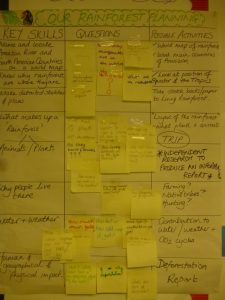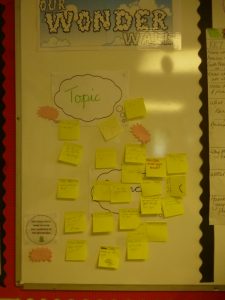Background
Shirley Clarke states, “Formative Assessment is essentially about pupils being actively involved in their learning, so their input into it needs to start before lessons begin, at the planning stage…..What is clear is that structured involvement increases their motivation and leads to higher achievement.”
What we did – co-constructing the planning of our Rainforest Topic
1. Finding out what they already knew:
I gave the Y5/6 pupils pictures of the Rainforest (our new topic), posted a list of vocabulary on the IWB, and then invited discussion on what they already knew and what they wanted to find out. Using their Talk Partners, followed by whole-class feedback, I was given a feel for the knowledge and skills I needed to cover, misconceptions I needed to address, and the appropriate pitch I needed to take during the subsequent teaching.
2. Finding out what they wanted to learn and ideas on how to achieve it:
In order to focus their excitement and imagination into a term’s worth of work (rather than a year’s worth!) I presented the children with the key skills that we needed to cover on a large flip-chart. They were then invited to write their focused questions on post-it notes, which we matched up to the skills that we needed to cover.

From there, we discussed activities that we could do which would help answer our questions. Any question that did not fit into our ‘skills-based’ plan, was posted onto our Wonder Wall (“I wonder….”).

This wall is for any question, at any time during the topic, which children want to find out about. During the topic, any pupil can research and post answers to those “additional” questions.
3. Immersion in the subject:
We immersed the children in the subject via a trip to ‘The Living Rainforest’ (Oxfordshire). Whilst we were unable to carry out the trip at the start of the unit (fully booked), the trip occurred half-way through and inspired them enormously, helping with their research for extended writing tasks.
What was the impact?
Without doubt, there was a huge increase in independence and ownership of the topic. We were learning about what they wanted to learn about, and they felt that their suggested activities were valued. Children felt that they ‘controlled’ the topic’s direction, giving them more motivation and enjoyment. The visibility of the planning to all pupils, all of the time, helped them understand where they were along the journey of the topic, and helped prompt further questions in advance of the lesson. In summary, they were fully involved as active learners.
